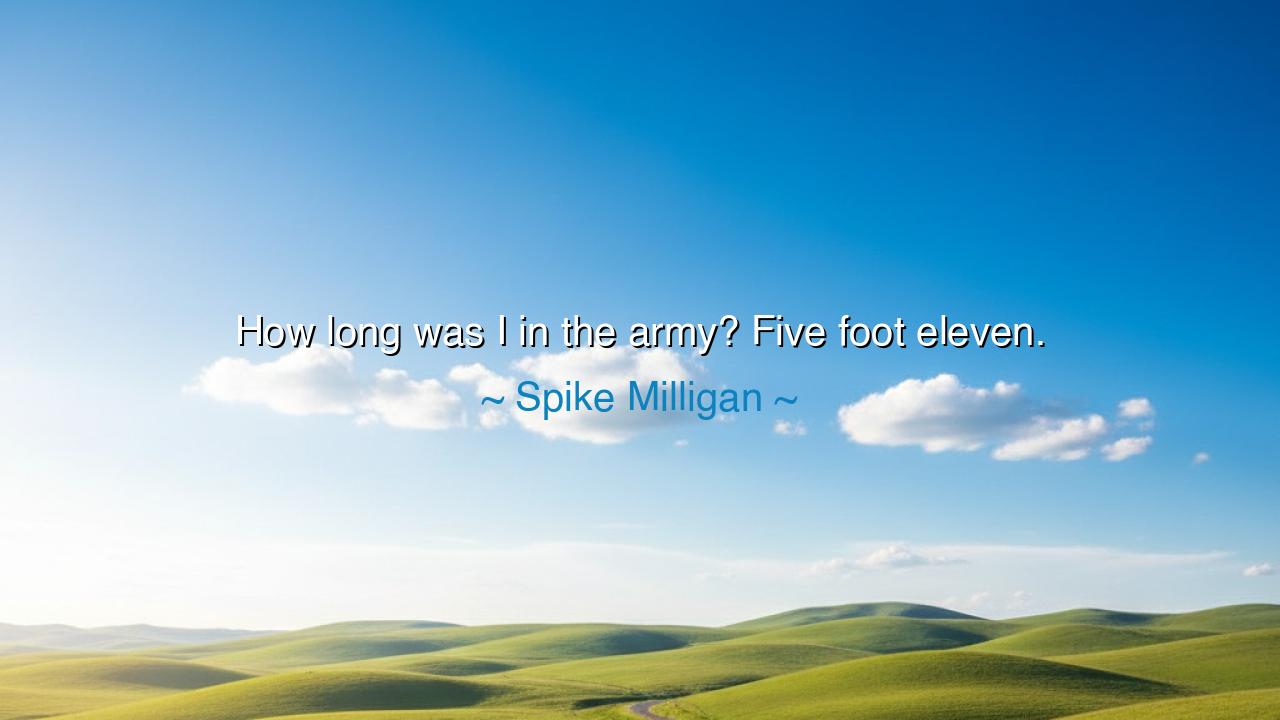
How long was I in the army? Five foot eleven.






In the age when the world was torn by fire and thunder, when the sons of men marched beneath banners not of their choosing, Spike Milligan, a jester forged in war, spoke words that gleamed with both sorrow and laughter: “How long was I in the army? Five foot eleven.” To the unthinking ear, it is a jest — a play of words, a twist of logic. Yet to those who listen deeply, it is a cry from the soul, a riddle revealing the weight of war upon the spirit. For Milligan, a man of wit and wounds, meant not only to make us laugh, but to awaken us to the truth that war does not end when the guns fall silent — it dwells in the very stature of a man, in every inch of his being.
The army was not for Milligan a place in time, but a place in self. When he says he was “in the army” for “five foot eleven,” he speaks not of years, but of the totality of his existence. It consumed him, body and soul, from crown to sole. Each inch of his height bore the mark of service, each breath carried the echo of the march, each heartbeat kept time with the drum of duty and dread. The army was not merely an experience — it became his shape, his identity, the very measure of his humanity. Thus, the jest becomes revelation: a man does not merely serve in war; he becomes war’s reflection.
Consider the story of Wilfred Owen, the poet-soldier who perished in the final days of the Great War. His words, like Milligan’s, carried both truth and torment. “My subject is War,” he wrote, “and the pity of War.” Though his body fell in the mud of France, his voice lived on — for war had not only claimed his life, it had etched itself upon his soul. Like Milligan, Owen did not count his service in months or medals, but in the depth of his being. When Milligan jokes that his time in the army is measured by his height, he too confesses: the soldier never leaves the battlefield entirely; a part of him remains at attention forever.
In ancient times, warriors returned from battle to find their hearts unmoored. Some could not sleep without hearing the clash of steel, others could not walk beneath the sun without seeing the ghosts of comrades. Milligan’s humor was his shield, his way of bearing the unbearable. Through laughter, he alchemized suffering into wisdom. The ancients would have called this catharsis — the purification of the soul through art. In every jest, he sought not escape, but balance. For laughter, when born of pain, is not denial — it is defiance.
The deeper wisdom of the quote lies in its paradox. To measure one’s time in the army by one’s height is to say that the experience cannot be confined to a calendar. True transformation — whether wrought by war, love, loss, or revelation — stretches through the whole of one’s being. It is not a season but a reshaping. And so, Milligan’s words teach that the greatest trials of life do not pass through time — they pass through us. Every person who endures great suffering carries it in their very stature, their eyes, their silence, their humor. The measure of such endurance is not in days, but in depth.
We see this truth also in the tale of Odysseus, who wandered ten years after the Trojan War, yet even upon his return, remained a soldier in spirit. Though he laid aside his armor, the sea still roared within him. Like Milligan, Odysseus was no longer merely a man — he was a living testament to struggle, endurance, and cunning. The war lived within him, as it lives within all who have faced the abyss and returned with stories instead of scars.
And so, O listener, what lesson may we draw from the laughter of the wounded clown? It is this: when life demands your strength, give it — but do not let it take your soul. Every hardship you endure will shape you, every trial will become a thread in the tapestry of your being. Do not count your battles by their duration, but by how they have deepened your understanding. When you emerge from suffering, do not curse it — transform it, as Milligan did, into art, into wisdom, into laughter that heals.
Therefore, walk tall — whether you stand five foot eleven or not. Let your stature be not a measure of inches, but of resilience. Bear your wounds with humor, your memories with grace. For in the end, it is not the length of our trials that defines us, but how fully they live within us — and how bravely we rise, laughing, once more into the light.






AAdministratorAdministrator
Welcome, honored guests. Please leave a comment, we will respond soon